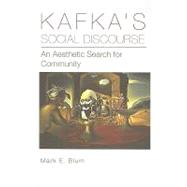
Note: Supplemental materials are not guaranteed with Rental or Used book purchases.
Purchase Benefits
What is included with this book?
| Preface | p. 9 |
| Acknowledgments | p. 19 |
| Kafka's Social Discourse as an Aesthetic Search for Community | p. 23 |
| Social Discourse and the Actualization of the Good | p. 51 |
| Amerika as an Anatomy of Social Discourse | p. 79 |
| The Trial as the Social Discourse of Self in a Community of Others | p. 124 |
| The Castle and the Social Discourse of Community | p. 170 |
| The Castle as a Pastoral Narrative: ôThe Good,ö ôThe Beautiful,ö and the Human Community | p. 207 |
| Notes | p. 245 |
| Bibliography | p. 273 |
| Index | p. 289 |
| Table of Contents provided by Ingram. All Rights Reserved. |
The New copy of this book will include any supplemental materials advertised. Please check the title of the book to determine if it should include any access cards, study guides, lab manuals, CDs, etc.
The Used, Rental and eBook copies of this book are not guaranteed to include any supplemental materials. Typically, only the book itself is included. This is true even if the title states it includes any access cards, study guides, lab manuals, CDs, etc.